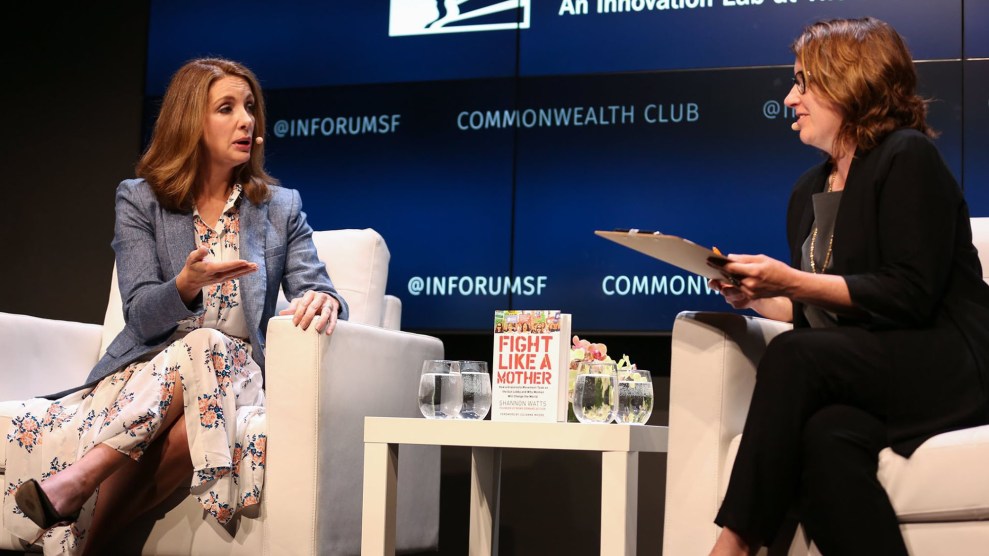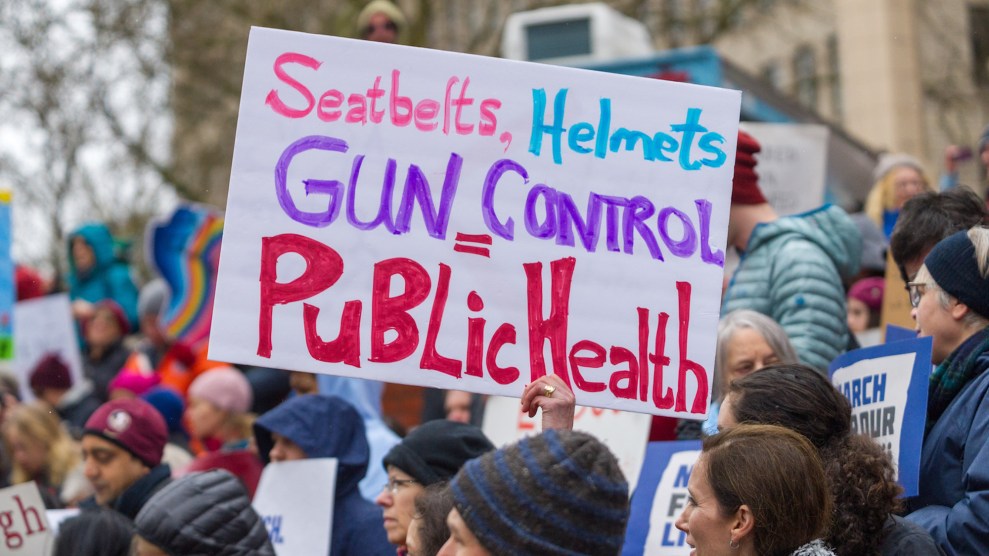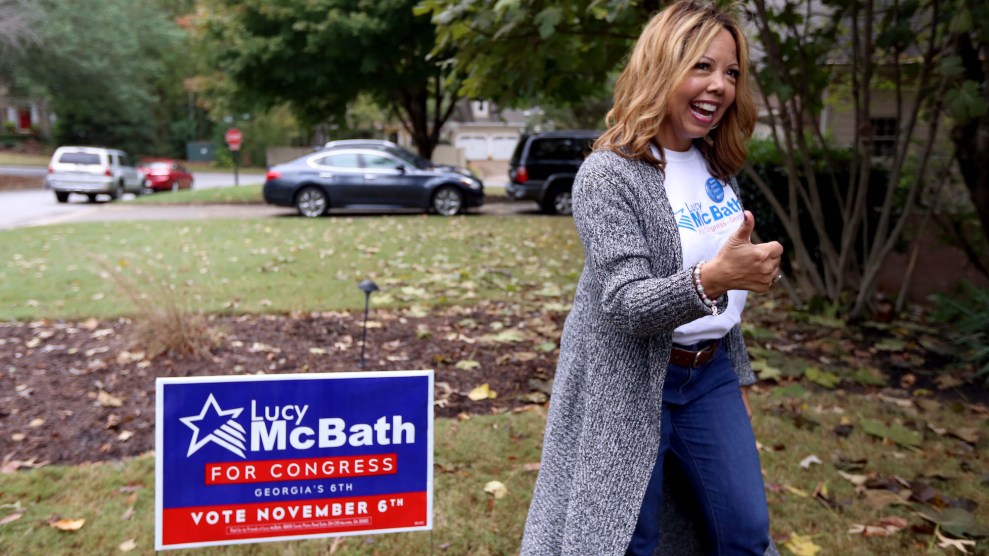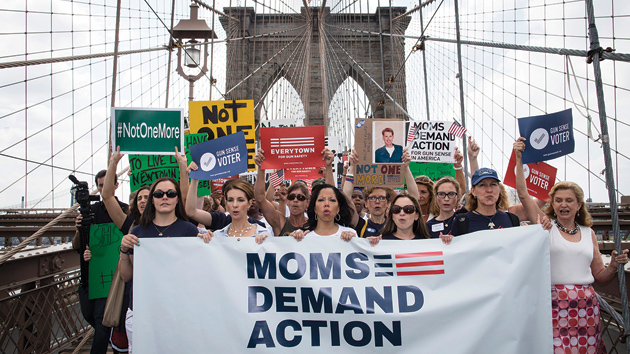
Shannon Watts (left), the founder of gun-safety organization Moms Demand Action, with Mother Jones' editor-in-chief Clara Jeffery (right) in June at The Commonwealth Club in San Francisco. Sonya Abrams/Inforum at the Commonwealth Club
Shannon Watts, a stay-at-home mother of five, was folding laundry in front of her television in 2012 when she heard the news that a gunman had walked into Sandy Hook Elementary School in Newtown, Connecticut, and fatally shot 26 people, mostly children. As she watched coverage of the tragedy, her emotions turned from shock to despair to outrage. Then she decided to do something about it.
She created a Facebook page and was soon inundated with offers to get involved. The grassroots organization has grown into one of the most effective gun reform groups in the country, Moms Demand Action, boasting nearly six million supporters. An army of red shirt-wearing activists now show up around the country to lobby members of Congress, representatives in state legislatures, and CEOs of private companies. So far, the group has helped push 20 states into passing gun-safety legislation, and have successfully persuaded Starbucks, Dick’s Sporting Goods, and other businesses to ban firearms from their stores. Now, Watts has a new book, Fight Like a Mother—part-memoir, part-guide for activists—documenting her meteoric rise from stay-at-home mom, to the NRA’s worst nightmare.
Mother Jones’ editor-in-chief Clara Jeffery sat down with Shannon Watts in June at The Commonwealth Club in San Francisco to discuss how Moms Demand Action has changed the country’s conversation about guns, just in time for the 2020 presidential election.
Listen to Clara Jeffery interview Shannon Watts on the latest episode of the Mother Jones Podcast below, or read on for an edited version of the conversation:
I think most people, most parents certainly, know where they were when they first heard about the shooting at Newtown. That night you went home and logged onto Facebook and wrote a call to action. You’re a mom, but you’re also an experienced communications professional. Did you know what you were about to start?
I had absolutely no idea. I had gone online and looked for something like Mothers Against Drunk Driving, thinking, “Surely this already exists.” It’s my moment to get off the sidelines. I’m devastated by what’s happened. I’m angry that I’m seeing pundits and politicians on my television set saying the solution to this crisis is more guns, and I’m gonna go ahead and join what’s already been started.
I couldn’t find anything. I found some male-run think tanks in Washington, D.C., I found some one-off state organizations, also mostly run by men. I knew I wanted to be part of a badass army of women across the country.
So, I started this Facebook page. I appreciate the compliment about my communications background, but the fact that I called it One Million Moms for Gun Control should tell you that I was alone in my kitchen and not with a focus group. Soon after, I got a call from Representative Carolyn McCarthy (D-N.Y.), whose husband and son were shot on the Long Island Railroad. She says, “No one uses the phrase gun control. We’ve been waiting for moms and women to organize across the country, but we can’t do it with that name.” So we changed our name a couple of weeks later.
What made you think that the rubric of moms and an organization, at least initially led by moms, could be a game-changer?
I intuitively felt that women, but in particular moms, were the yin to the gun lobby’s yang. The gun lobby had made this group of local extremists, a vocal minority, afraid their guns would be taken away. But 80 million moms in this country, regardless of political party, were afraid their children would be taken away. If we could get together and unite on this issue then we could quickly solve it, just like we solved so many issues in this country.
You speak about this superpower of moms, and I think we’ve seen in other political organizing over the last couple of years how women use skills that they use in their jobs and their homes, but maybe never thought that they could use those to effect massive political change. Tell me what you think those are.
Well, first of all, we spend a lot of time negotiating. We spend a lot of time budgeting and planning for family spending, and also we’re multitasking.
The other thing is that when you spend any time in a statehouse, you very quickly realize that these are not rocket scientists. I would trust very few of them to get me a cup of coffee, let alone make the laws that protect my family and my community. That’s why our volunteers have moved from shaping policy to making it, because they realize that the skills they have as a mom have qualified them to do this job.
I’m wondering how you think that having an army of moms in red shirts takes the wind out of protesters, counter-protesters, or perhaps the legislators?
We’ve built this brand that really makes women feel empowered. The other thing we’ve learned is that motherhood can be used as a weapon against you unless you use it as a tool. I can’t tell you how many times the gun lobby has attacked me and said, I must drink boxed wine in my driveway and take Xanax, and I’m not a “real mom.”
We only hold 20 percent of the lawmaker positions in this country. We’re less than 5 percent of Fortune 1000 CEOs. But when we speak, lawmakers listen, and we weren’t even showing up before. It’s not like there are all of these volunteers in red shirts versus an equal number of gun extremist or even NRA members. It’s all of us versus one or two gun lobbyists. When lawmakers see that, it makes a difference.
There were a number of high-profile instances when Moms Demand Action volunteers were confronted by open-carry activists. That must have been terrifying. Do you still face that kind of physical intimidation out there?
We do. Open carry is legal in 45 states. In Colorado, you can walk up and down Pearl Street with an A/R 15 strapped to your chest but not a dog. That’s the absurdity of the gun laws in our country.
In one of the early examples, four of our volunteers were having a membership lunch in a restaurant. They looked out the window and 40 people were pulling up in pickup trucks and pulling long guns out of their cars and just holding them and posing with them and waiting for these women to come out of the restaurant. There was nothing the police could do because it’s perfectly legal. They may have realized that was a very bad visual that went viral, and it didn’t do what they had hoped it would do, which was to silence and intimidate us.
When that happens, do you think the visual and the public sympathy is more likely to go to you as a group of women with that kind of mom’s identifier?
I do. I think that’s why they don’t do it quite as much as they used to because they realize that it didn’t have the impact they wanted it to. It’s how we got Starbucks and so many other companies to change their policies because when you see someone with a gun in their pocket, or an AR-15 strapped to their chest, ordering a latte, you realize that there’s something very wrong with this country.
What happened with Starbucks?
I saw on the news that Starbucks was no longer going to allow smoking 20 feet outside its stores. We called and said, “Will you still allow open carry?” They said, “Yes, we’re still going to follow the law.” And our volunteer said, “Well, we’re more afraid of secondhand bullets than secondhand smoke.”
We were too small to do a boycott, so we embarked on a campaign called “Skip Starbucks Saturdays.” Even then the soccer moms gave me a really hard time about not having coffee on Saturday! But within three months, Howard Schultz came out on television and said guns are no longer welcome in our stores.
We replicated that using hashtag like #BurritosNotBullets for Chipotle. Now we have companies like Levi’s, Dick’s Sporting Goods, and Toms Shoes coming to us and saying, not only do we want to have the right policies, but we actually want to be part of your coalition.
You personally have faced a lot of threats. Tell us what you feel comfortable sharing about that.
Within hours the threats of death and sexual violence started against me, against my daughters. Letters, emails, people driving by my house. I called the police in the early days—I lived in Indiana—and the officer who came to my house said, “Well, that’s what you get when you mess with the Second Amendment, ma’am.” I realized that I was on my own, but also that, if we lose our children we have nothing left to lose.
The NRA has started attacking me more and more, I think, to distract from what they’re going through. The death threats in the last three weeks have been a reminder of what it was like in the early days. It’s been that intense. But I’m hopeful that it’s a good sign that they’re losing a lot of their power.
And given all that, you’re still not at all shy about mixing it up on Twitter. Why is being so personally visible and confrontational even a good strategy?
I’m happy to be the tip of the spear. There needs to be someone who will absorb the blows and also correct the NRA’s misinformation.
In the past after mass shootings, people would say, “Oh, it’s too early to talk about we can’t politicize a tragedy.” When I started the organization I said, “We’re going to talk about this when there is a tragedy because there’s no better time to talk about it. It’s political because the gun lobby’s writing our gun laws.” The blowback I got from the NRA was so intense, and now no one bats an eye. Some of it is that cultural change.
How do you get to the point where you can make common cause for those who are not moms or who are moms but think, ‘Oh, this is a group for white affluent moms, not me’?
I get asked a lot, “Why aren’t we Parents Demand Action or Some Women Demand Action?” I am a white, suburban mom, and I was scared my kids weren’t safe in school. And so many other women who came to the organization after Sandy Hook looked like me. So we had to work very hard to diversify. Last year, over 40 percent of our new hires were non-white. But after the Parkland tragedy, we tripled the size, and the people who came into the organization look like me again. So what I learned was this is a never-ending effort, that we always have to work on it.
This is an easy softball for you, tell me some successes the movement has had.
The whole point of my book is to explain that we’re winning. I really think that hopelessness and cynicism are dangerous. We have closed the background check loophole in 21 states. We have disarmed domestic abusers in 28 states. We have passed Red Flag laws in 15 states. Last year, after the Parkland tragedy, our volunteers showed up in statehouses and as a result, 20 states passed stronger gun laws. Nine were signed by Republican governors. All of this momentum is building.
What would you feel would be the most immediately effective in reducing carnage? Ammo clips? Red Flag laws? There’s background checks and assault weapons bans. Which is the one that you think is maybe the thing that would really make the difference?
Absolutely background checks. That’s really the foundation to every other law. In 29 states, you can buy a gun without a background check from an unlicensed dealer, either online or at a gun show. And it’s how dangerous people and domestic abusers and minors and others have easy access to guns in this country. And every state is only as safe as the state bordering them and what their gun laws are like.
What’s the Democratic field looking like? Who’s good on gun reform, who’s not so good?
Pretty much everyone is excellent, and that is a sea change in American politics. When I talk about the fact that we’re winning, just a few years ago this issue was the third-rail of American politics. I give Hillary Clinton a lot of credit, but I’m also assuming it polled well. She knew that this was an issue that women, in particular, would vote on and that has continued.
















